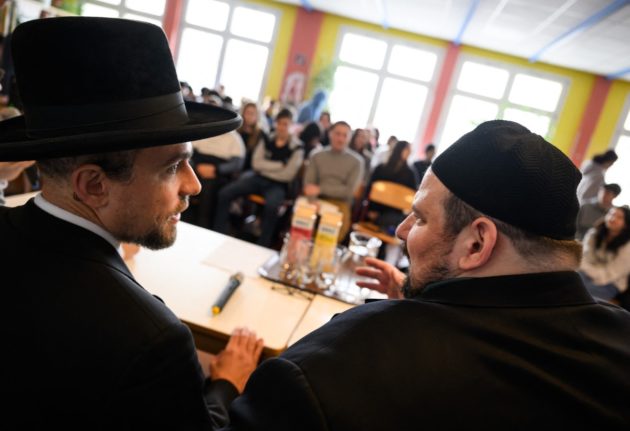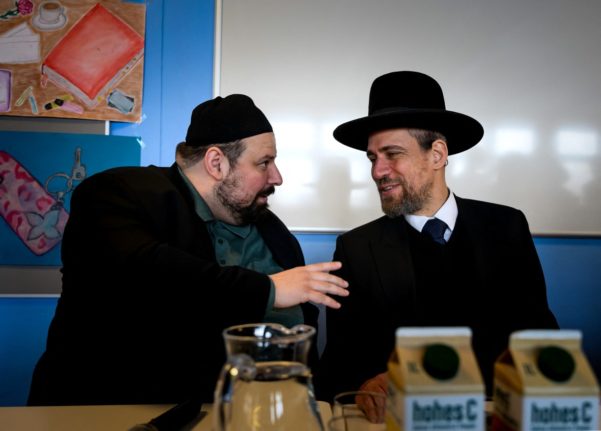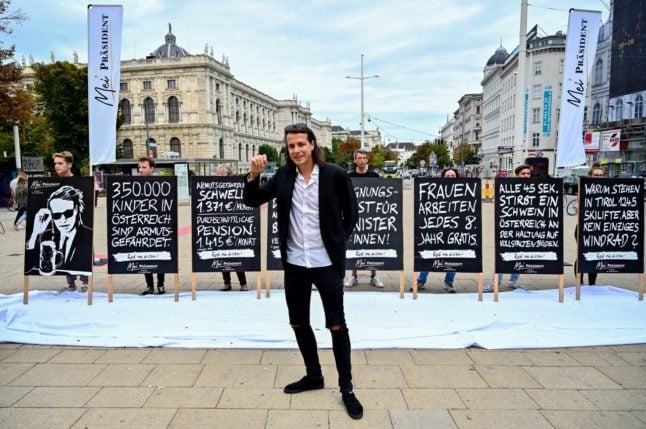The two men’s talks, educating students about their religions, have taken on additional pertinence since the October 7 Hamas attack on Israel and Israel’s subsequent relentless bombing of Gaza.
Since then Austria has seen a rise in both anti-Semitic and anti-Muslim acts, as elsewhere in Europe.
“We must separate religion from politics,” rabbi Hofmeister, 48, told the students, while imam Demir, 38, nodded in support. “This is not a religious war, it is a political conflict, a terrible conflict that must not impact our communities here in Europe,” Hofmeister added.
The two volunteers are in high demand because “just our friendship alone defies stereotypes”, according to Demir. Their diaries are packed until June, with the pair visiting some 30 Austrian schools.
During last week’s two-hour discussion at a high school in a working-class suburb of the capital, questions came thick and fast from the students aged 16 to 18.
A livestream allowed those unable to get a seat in the large hall to hear them explain how Jews and Muslims pray to the differences between kosher and halal.

Talk on ‘equal footing’
The two bearded men — one wearing a kufi cap, the other a wide-brimmed fedora hat — met 10 years ago during an inter-religious project and have since worked together, travelling to Turkey, Israel and the Palestinian territories.
The Gaza war has not affected their friendship, they say.
“We want there to be peace, without any ifs and whens,” Demir said, while Hofmeister added that he was “glad they started to cooperate so early on to be able to address the current crisis.”
The war started when Hamas attacked Israel on October 7, resulting in the deaths of about 1,160 people in Israel, mostly civilians, according to an AFP tally of official Israeli figures. But concern has mounted amid the high civilian death toll from Israel’s retaliatory campaign, now at almost 30,000, according to the health ministry in Hamas-run Gaza.
The Vienna school where the pair were speaking has 1,200 students of 63 different nationalities, although none identify as Jewish.
At each break, numerous students crowd around the duo, who use humour to lighten the atmosphere.
“It’s interesting to see how similar religions are,” 17-year-old Estella Dolas told AFP.
Austria is a majority Catholic country, with Muslims making up around 8 percent of the population. Only 0.1 percent — just 5,400 people — declared themselves as Jewish in the 2021 census.
School director Inge Joebstl, 55, said the rapport and respect between the two men, who spoke “on an equal footing”, made the students more receptive.
Especially since many of them will otherwise look for answers on social networks where “self-proclaimed experts converted two years ago explain to them what Islam is”, warned Demir.
“After we leave, the students may not remember everything we told them,” admitted Hofmeister. “But they will remember that an imam and a rabbi came to their school and that they got along well.”



 Please whitelist us to continue reading.
Please whitelist us to continue reading.
Member comments